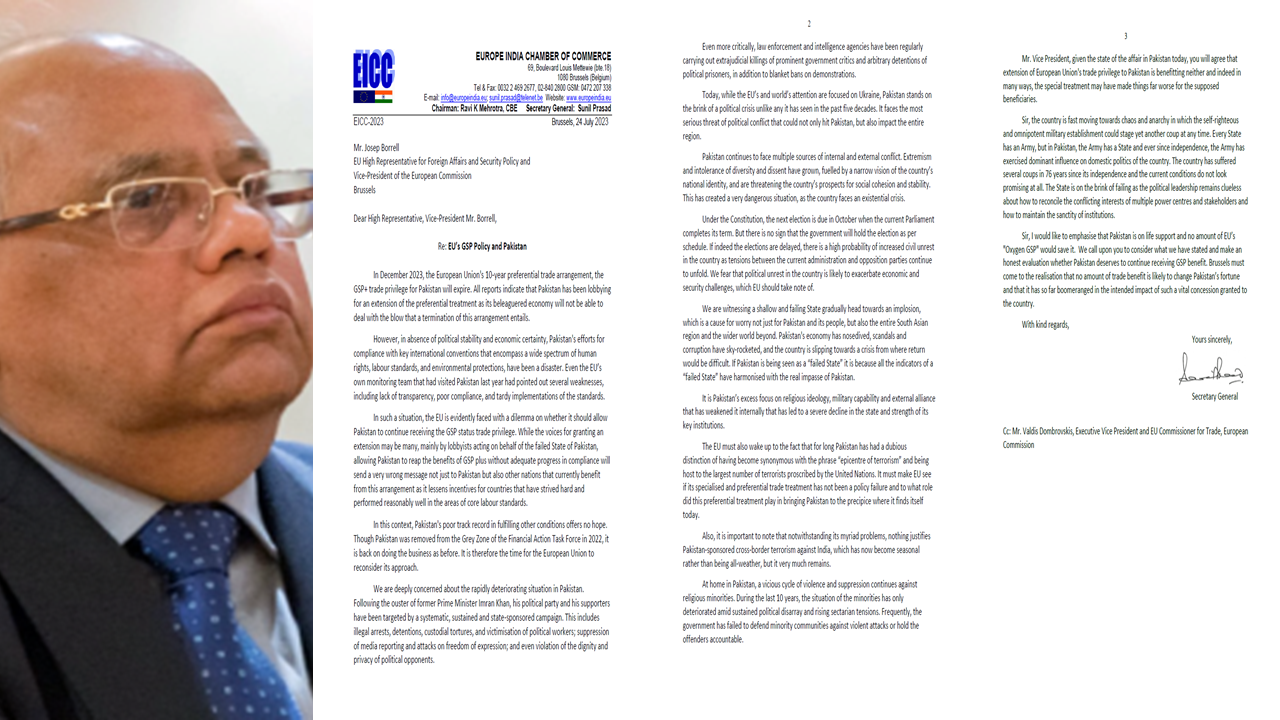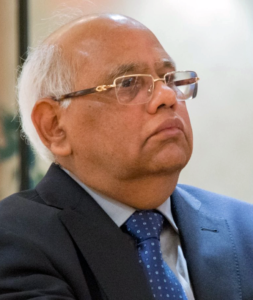EICC warns EU against extension of GSP+ trade privilege to Pakistan
The leading Indo-European trade body, Brussels-based Europe-India Chamber of Commerce (EICC) has warned the European Union against granting extension to Pakistan for the GSP+ trade privilege that expires at the end of this year.
According to a press statement by EICC, Sunil Prasad, Secretary General of EICC, written to Josep Borrell, EU High Representative for Foreign Affairs and Security Policy and Vice-President of the European Commission, warning of the risks that such an extension to Pakistan carries.
In the letter, Prasad says that as the deadline for GSP+ privilege approaches all reports indicate that Pakistan has been lobbying for an extension of the preferential treatment as its beleaguered economy will not be able to deal with the blow that a termination of this arrangement entails.
“However, in absence of political stability and economic certainty, Pakistan‘s efforts for compliance with key international conventions that encompass a wide spectrum of human rights, labour standards, and environmental protections, have been a disaster. Even the EU’s own monitoring team that had visited Pakistan last year had pointed out several weaknesses, including lack of transparency, poor compliance, and tardy implementations of the standards,’’ says Prasad in the letter that was sent today.
The EICC official adds that in such a situation, the EU is evidently faced with a dilemma on whether it should allow Pakistan to continue receiving the GSP status trade privilege. “While the voices for granting an extension may be many, mainly by lobbyists acting on behalf of the failed State of Pakistan, allowing Pakistan to reap the benefits of GSP plus without adequate progress in compliance will send a very wrong message not just to Pakistan but also other nations that currently benefit from this arrangement as it lessens incentives for countries that have strived hard and performed reasonably well in the areas of core labour standards,” says the letter.
He adds that Pakistan’s poor track record in fulfilling other conditions offers no hope. Though Pakistan was removed from the Grey Zone of the Financial Action Task Force in 2022, it is back on doing the business as before. It is therefore the time for the European Union to reconsider its approach, says the EICC.
“We are deeply concerned about the rapidly deteriorating situation in Pakistan. Following the ouster of former Prime Minister Imran Khan, his political party and his supporters have been targetted by a systematic, sustained and state-sponsored campaign. This includes illegal arrests, detentions, custodial tortures, and victimisation of political workers; suppression of media reporting and attacks on freedom of expression; and even violation of the dignity and privacy of political opponents,’’ says Prasad.
Even more critically, law enforcement and intelligence agencies have been regularly carrying out extrajudicial killings of prominent government critics and arbitrary detentions of political prisoners, in addition to blanket bans on demonstrations.
Today, while the EU’s and world’s attention are focused on Ukraine, Pakistan stands on the brink of a political crisis unlike any it has seen in the past five decades. It faces the most serious threat of political conflict that could not only hit Pakistan, but also impact the entire region, warns the letter.
Pakistan continues to face multiple sources of internal and external conflict. Extremism and intolerance of diversity and dissent have grown, fuelled by a narrow vision of the country’s national identity, and are threatening the country’s prospects for social cohesion and stability. This has created a very dangerous situation, as the country faces an existential crisis.
The EICC says that under the Constitution, the next election is due in October when the current Parliament completes its term. But there is no sign that the government will hold the election as per schedule. If indeed the elections are delayed, there is a high probability of increased civil unrest in the country as tensions between the current administration and opposition parties continue to unfold. We fear that political unrest in the country is likely to exacerbate economic and security challenges, which EU should take note of.
“We are witnessing a shallow and failing State gradually head towards an implosion, which is a cause for worry not just for Pakistan and its people, but also the entire South Asian region and the wider world beyond. Pakistan’s economy has nosedived, scandals and corruption have sky-rocketed, and the country is slipping towards a crisis from where return would be difficult. If Pakistan is being seen as a “failed State” it is because all the indicators of a failed State have harmonised with the real impasse of Pakistan,’’ Prasad warns in the letter.
It is Pakistan’s excess focus on religious ideology, military capability and external alliance that has weakened it internally that has led to a severe decline in the state and strength of its key institutions.
The EICC says that the EU must also wake up to the fact that for long Pakistan has had a dubious distinction of having become synonymous with the phrase “epicentre of terrorism” and being host to the largest number of terrorists proscribed by the United Nations. It must make EU see if its specialised and preferential trade treatment has not been a policy failure and to what role did this preferential treatment play in bringing Pakistan to the precipice where it finds itself today.
Also, it is important to note that notwithstanding its myriad problems, nothing justifies Pakistan-sponsored cross-border terrorism against India, which has now become seasonal rather than being all-weather, but it very much remains.
At home in Pakistan, a vicious cycle of violence and suppression continues against religious minorities. During the last 10 years, the situation of the minorities has only deteriorated amid sustained political disarray and rising sectarian tensions. Frequently, the government has failed to defend minority communities against violent attacks or hold the offenders accountable.
“Given the state of the affair in Pakistan today, you will agree that extension of European Union‘s trade privilege to Pakistan is benefitting neither and indeed in many ways, the special treatment may have made things far worse for the supposed beneficiaries. Sir, the country is fast moving towards chaos and anarchy in which the self-righteous and omnipotent military establishment could stage yet another coup at any time. Every State has an Army, but in Pakistan, the Army has a State and ever since independence, the Army has exercised dominant influence on domestic politics of the country. The country has suffered several coups in 76 years since its independence and the current conditions do not look promising at all. The State is on the brink of failing as the political leadership remains clueless about how to reconcile the conflicting interests of multiple power centres and stakeholders and how to maintain the sanctity of institutions,’’ says the top official of the EICC.
“Sir, I would like to emphasise that Pakistan is on life support and no amount of EU’s “Oxygen GSP” would save it. We call upon you to consider what we have stated and make an honest evaluation whether Pakistan deserves to continue receiving GSP benefit. Brussels must come to the realisation that no amount of trade benefit is likely to change Pakistan’s fortune and that it has so far boomeranged in the intended impact of such a vital concession granted to Pakistan,’’ he says.











